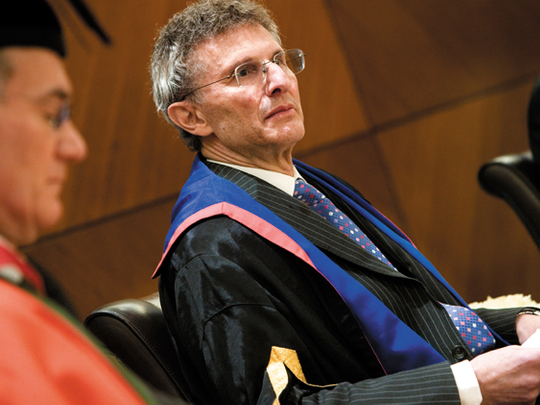
He has worn many hats since he started out in the business world. From his first job as an accountant to running a textile company, heading up the British government’s accountancy service and, finally, his current job as dean of one of the world’s best business schools, Andrew Likierman’s career has known no boundaries.
Despite his daunting résumé, he remains incredibly humble when discussing his numerous successes. His voice takes on a distinct tone of enthusiasm whenever the conversation turns to his students and the school.
In Dubai to present the London Business School’s executive MBA degree, Likierman’s pride is apparent as he applauds the graduates.
He is very clear about what should attract students – quality. The word crops up time and again when he discusses maintaining the school’s top ranking. (It has been ranked number one in Forbes’ and the Financial Times’ surveys of the world’s leading business schools.)
“Quality is extremely important to me,” stresses Likierman, 66, as he settles down for our interview after the Dubai graduation. “A combination of a winning faculty, high teaching standards and quality course content are the cornerstones of my vision for the London Business School.”
Yet the man who is instrumental in shaping the minds of tomorrow’s leaders insists he does not have a blueprint for success. Likierman says that there is no road map to catapult a student to the top.
What he does say is that the school challenges students. “We motivate them to delve deep within themselves to find out what is right for them and to pursue that dream.
“I believe students must be given the opportunity to develop in their own way – that is education in the true sense; it brings out the best in people rather than handing out a
set of values,” he says.
The Dubai campus was opened in 2006. “Our Dubai centre has become a global hub and complements the diversity of our London campus,” says Likierman. He says that he is proud to see that the students enrolled in the programme come from across the Middle East, Asia, Europe and Africa.
Likierman spent a decade as one of the managing directors of the British Treasury and head of the British government’s accountancy service. He spearheaded an initiative to improve the quality of governmental central management so that departments could maximise resources.
“It was fascinating to take on such a challenge from the beginning and see it through to the end,” he says. He was knighted for his services in 2001. Apart from running the London Business School, he is also a non-executive director of Barclays Bank and the Bank of England. “I enjoy variety,” he admits. “If an opportunity comes along, I have to take it up.”
This explains why after his first job as an accountant in 1965, he went on to run a textile factory. He then launched a business selling business books, which he later sold. He laughs when he says he wishes he had thought of the Amazon concept. “I had set out to supply books in a way that had not been supplied before,” he says. But although Amazon beat him to that particular benchmark, he went on to write three books of his own on public finance and nationalised industries.
Likierman has two children. His son lives in Toronto and runs a website. His daughter, a lawyer, has two young daughters of her own. Laughing out loud, he says, “I’m sure I gave them a lot of advice, but I’m not sure if they took it. I encourage them to think for themselves. That’s the key.”
Any mention of the business school and the experience it offers gets him animated. Challenging students while changing their lives remains Likierman’s continual focus.
I, ME, MYSELF
I believe that we should try to do the big things as well as the little things well. By that I mean that we should focus on the entire picture, from the quality of what we do in terms of the faculty we hire, to the curriculums we include.
I feel it’s a virtuous circle because if you get a good faculty, you attract good students, thereby upholding a high standard in the school. When I talk about little things, we try our best to offer a fantastic all-round experience to our students.
I think we provide education in the true sense of bringing the best out of people. I like to think we guide them to achieving their goals, rather than instilling in them a particular set of values. Our educational philosophy is to provide the means through which they can find fulfilment.
Some of them will become renowned leaders, there is no question about it. Others do not necessarily want to be leaders. They want to attain a particular set of skills and develop them. They may prefer to work in teams.
So we don’t carry the assumption that we have a blueprint to apply across the board. We cannot simply take somebody and turn them into a leader overnight.
I believe that it is important to have a very clear philosophy and I think that we do at London Business School. Ours is perhaps a more eclectic approach which gives students the opportunity to develop themselves in their own way.
But of course, we offer the opportunity to people to grow as leaders. We give them the tools to lead and an understanding of the context within which they can exercise their leadership skills. I don’t define leadership in the military sense of controlling others; by leadership I mean bringing out the best in others.
I think a school’s philosophy and values are not about instructing what you should do and how you should do it. We don’t necessarily set out with a philosophy which promotes particular ways of thinking. Education is about challenging people to think about their own ideas; to bring to the fore the things that they understand and believe in. We simply give them a framework – a different understanding or way of thinking about things. There has been a lot of controversy about whether people who come from business schools behave unethically and so on.
I don’t believe that this is something inherent. A section of the programme deals with social responsibility. We understand that this is something people need to know about. In some schools this is merely an option; I believe it should form the core part of a course.
I have been at London Business School on and off ever since it started. I have left
it twice and come back twice because it’s such an interesting place. It certainly changed me because it has enabled me to think about things that I would have never thought
about before. I also got to meet people I would have never met before. It is a place that has a lot of intellectual energy as well as a lot of physical energy – a one of a kind buzz. It is an exciting environment in which to work.
I enjoy two things. First of all, I enjoy variety. One of the reasons I’m at a business school is because it provides the opportunity for intellectual engagement. It also involves one in the world of work – in the real world. So it brings together different strands. Secondly, I am always interested in opportunities cropping up. I think everybody should try to make their lives as interesting as possible.If they have the opportunity and the good fortune to find them, they should go for it.
I would like to revisit the good bits of my career and perhaps do better at the things I didn’t do so well in. But I’ve also been lucky to make the most of the opportunities that have been available to me. It was my strong educational grounding that enabled me to do many different things. An MBA was still new when I graduated. At the time I actually did something which was considered more conventional – I went into accountancy. I have since been able to use my financial knowledge in many different ways.
I hope that others also enjoy the skills, knowledge and broad understanding that I did as a result of hard work and a solid education.
I started selling books because I felt that the business of buying books at the time was inefficient. There was a specialist bookseller who sold books to businesses and people seemed to be dissatisfied with the poor service they got. So I set out to offer them a better level of service and supply books in a way that they had not been supplied before. If you wanted a book the next day, you would get it the next day.
At the time this was very unusual. Amazon did not exist; I was filling a market niche. But I found that it was very demanding as a business. I hired a manager and staff to run it.
By that stage I had started doing other things. I was building my academic career and became involved in a government inquiry into the costs of developing the North Sea oilfields. The final push was that I was asked to join the Central Policy Review Staff – the ‘Think Tank’ – which advised the British Cabinet. I couldn’t manage everything at the same time so I decided to sell the business.
I get very different kinds of satisfaction from different things. I find running the business school extremely interesting and very challenging. I enjoy ideas, so for me writing, discussing, lecturing and having the challenge of managing a classroom – a place where people challenge you all the time – is absolutely fascinating. But I also spent ten years working for the government, with whom I had a project which lasted nine years. I could see the ideas take shape and develop. Seeing the end results was immensely satisfying.
I, ME, MYSELF
Me and my knighthood
I would be very lucky if anything else I did was quite as big as the governmental programme (which led to my knighthood).
It involved extensive planning and control of an annual expenditure of £500 billion, and with an asset base of nearly £300 billion. What was very satisfying about the whole process was that I believe that the British government is now more efficient as a result. Certainly billions of pounds were saved because of it, so I feel very satisfied with the work we did.
Me and my goals
I do set goals for myself. At the moment, they are very much focused on the institution’s framework. I want London Business School to maintain its world-leading educational position. I would like students, the people who come through the London Business School, to have better lives than they did before they were educated there. What we do for people matters to me. If we can help people make more of their lives then I will be beyond satisfied. There is nothing is more important than education.
Me and my vision for the Dubai MBA
I would like to continue the legacy of offering a superb executive MBA. In Britain, Europe and the US we are already well known as being one of the world’s leading business schools. But I think that it is more difficult to differentiate yourself in Dubai.
We don’t have a physical campus here and therefore one business school may look like another business school. Again, it’s back to quality. I like that element of quality to
be recognised by the people who meet our students and by the students themselves.
I, ME, MYSELF
What is the mission of LondonBusiness School?
It is to be the pre-eminent global business school – that is our vision. We are constantly looking at and evaluating what values underpin the institution and what it is that makes us different from other business schools. This is a very interesting debate we have with our students and stakeholders.
Does the Dubai MBA programme also reflect the distinct cultural differences of doing business in the East and West?
We believe it does because of our faculty. We have a 100-strong faculty, only 15 of whom come from the UK; the rest come from around 30 different countries.
And of course we have students from all over the world – East and West. So we are not offering a particularly Western view, nor do we encourage it. We appreciate the fact that people come from different places and will therefore be able to offer many different approaches.
What do you enjoy doing when you’re not researching or crunching numbers?
I enjoy playing with my two grandchildren. They are both girls. Otherwise, I cycle everywhere. I enjoy the arts and I love music. I have got to know a wide range
of people through my academic life, business and governmental work.
I am proud to say that many of them became friends. I enjoy keeping in contact with them and always welcome their wide variety of viewpoints and perspectives.
When you look back at all your achievements, what stands out as your most shining moment?
That is an interesting question. I don’t see life as getting to a peak and then going down again. If a student calls me up after 30 years and says, “Hello. I often remember your lectures and I learnt a lot from you,” I get fantastic satisfaction from that. The little things should mean as much to you in life as the big things.
is a Dubai-based freelancer











